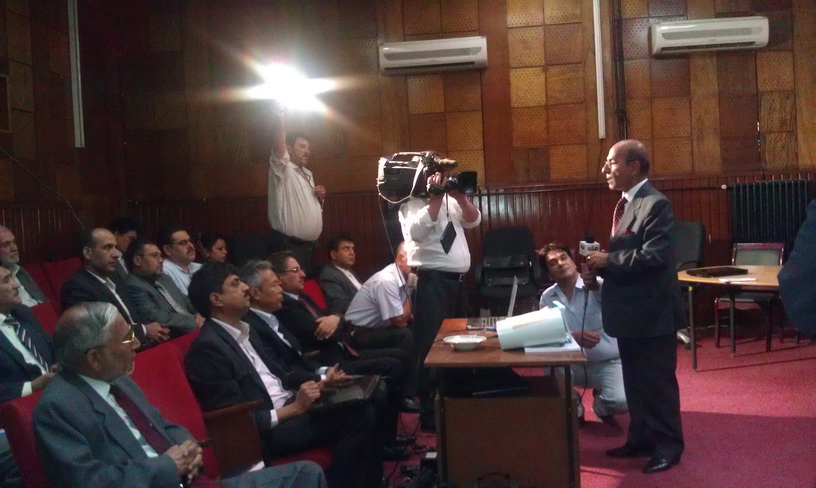Editorial Guideline is an Important Tool for Public Broadcasters

- © UNESCO/S. Habibullah
- Afghanistan’s Minister of Information and Culture, Mr. Sayed Makhdoom Raheen speaks briefly during the workshop at RTA.
Editorial Guideline is an Important Tool for Public Broadcasters
Editorial guideline is a crucial and important tool for every public service broadcasting (PSB) entity to fulfil its core mission that is to serve public’s interest. This is even more important in the context of a country in transition, such as Afghanistan, because a PSB can play a significant role to bring the country to move forward.
That was one of the highlights of a workshop on the preparation of an editorial guideline for broadcasters of Radio and Television Afghanistan (RTA) that was organized in and hosted by RTA with support from UNESCO Tehran Cluster Office (UTCO) and UNESCO Kabul Office, in Kabul, Afghanistan, 26 September. The workshop was initiated and designed based on the need RTA’s need to move forward in strengthening its role as the country’s public broadcaster that caters to the need of the Afghan people.
More than 20 RTA’s senior broadcasters including members of its Board of Directors were attending the one-day workshop, facilitated by Mr. Zulkarimein Nasution, a senior lecturer in the Department of Communication, Faculty of Social and Political Sciences of Universitas Indonesia, who has been involved in formulating the editorial guideline for Indonesian public broadcasters some years ago.
During the opening ceremony, Deputy Minister at the Ministry of Information and Culture, Professor Ghulam Farahi was delivering brief remarks. In the later session during the day, Minister of Information and Culture, Mr. Sayed Makhdoom Raheen was also attending the workshop briefly and made a statement reiterating the need for RTA to produce an editorial guideline that would make RTA’s programmes distinctive of programmes broadcast by other broadcasting organizations.
In his presentation, Mr. Nasution as the main resource person shared his experience when he was involved in preparing editorial guideline for Indonesian public broadcasters. He explained a short history of two Indonesian public broadcasting organizations, namely Television of the Republic of Indonesia (TVRI) and Radio of the Republic of Indonesia (RRI) who had transformed themselves quite successfully shortly after a political reform took place in Indonesia back in 1998, from state-owned broadcasters who were at times used as the mouth-pieces of the government, to become independent entities that carry out their core mandates to serve the public’s interests. Mr. Nasution also touched on some key principles of editorial guidelines in public broadcasters’ programme-making that would include from dealing with truth, to accuracy, balance, respect for privacy and reporting on sensitive issues, to citizen journalism.
In his closing remark, Director-General of RTA, Mr. Zarin Anzor expressed his high appreciation to the dynamic exchange of views during the entire session of the workshop. He stressed that RTA will undertake some necessary follow-ups based on the recommendation produced during the workshop, including the plan to establish a small team of RTA’s senior broadcasters who will prepare a first draft of an editorial guideline. As informed by Mr. Abdul Rahman Panjshiri, Director of Planning and International Relations of RTA at the end of the workshop, this draft will then be further discussed among a wider spectrum of experts and practitioners which will lead to the formulation of a final version of the guideline.
Contact: Arya Gunawan Usis, Advisor for Communication and Information – UTCO (a.gunawan@unesco.org)
- Source:UNESCO Tehran
- 28-09-2011

